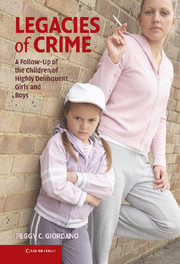Book contents
- Frontmatter
- Contents
- Acknowledgments
- 1 Introduction
- 2 Literature Review and Conceptual Framework
- 3 The Ohio Life-Course Study
- 4 OLS Adult Respondents: Offending, Surviving, Parenting
- 5 How Have the OLS Children Fared?
- 6 The Intergenerational Transmission Process
- 7 “Success Stories”: It's All Relative
- 8 Theoretical and Policy Implications of the OLS Study
- References
- Index
6 - The Intergenerational Transmission Process
Published online by Cambridge University Press: 05 June 2012
- Frontmatter
- Contents
- Acknowledgments
- 1 Introduction
- 2 Literature Review and Conceptual Framework
- 3 The Ohio Life-Course Study
- 4 OLS Adult Respondents: Offending, Surviving, Parenting
- 5 How Have the OLS Children Fared?
- 6 The Intergenerational Transmission Process
- 7 “Success Stories”: It's All Relative
- 8 Theoretical and Policy Implications of the OLS Study
- References
- Index
Summary
I don't talk to her. Because I'm mad at her. She smokes something she shouldn't be smoking. I call her a crackhead all the time. I should be living with her right now if she wasn't smoking crack.
The preceding chapters document that the original OLS respondents had numerous problems as adolescents, and our follow-ups indicate that many continued to have legal difficulties well into their adult years. Chapter Five details results indicating that many of their children had been victimized and also exhibited problem behaviors, with the severity of delinquency, drug/alcohol use, and violence often exceeding the types and levels we observe in a random sample of adolescents. We found a significant effect of the parents' substance-abuse problems on the variations in the children's self-reported delinquency, providing a general indication of intergenerational transmission processes at work within these families. In this chapter we describe in more detail the family and individual-level processes that we believe are important to a comprehensive understanding of the mechanisms underlying these cross-generational continuities, and also provide a framework for understanding variability in child outcomes. We outline a symbolic interactionist approach that can be conceptualized as a revised social learning perspective on intergenerational transmission, and illustrate with material drawn from the narratives of the children and adults who have participated in the OLS study.
- Type
- Chapter
- Information
- Legacies of CrimeA Follow-Up of the Children of Highly Delinquent Girls and Boys, pp. 125 - 162Publisher: Cambridge University PressPrint publication year: 2010



